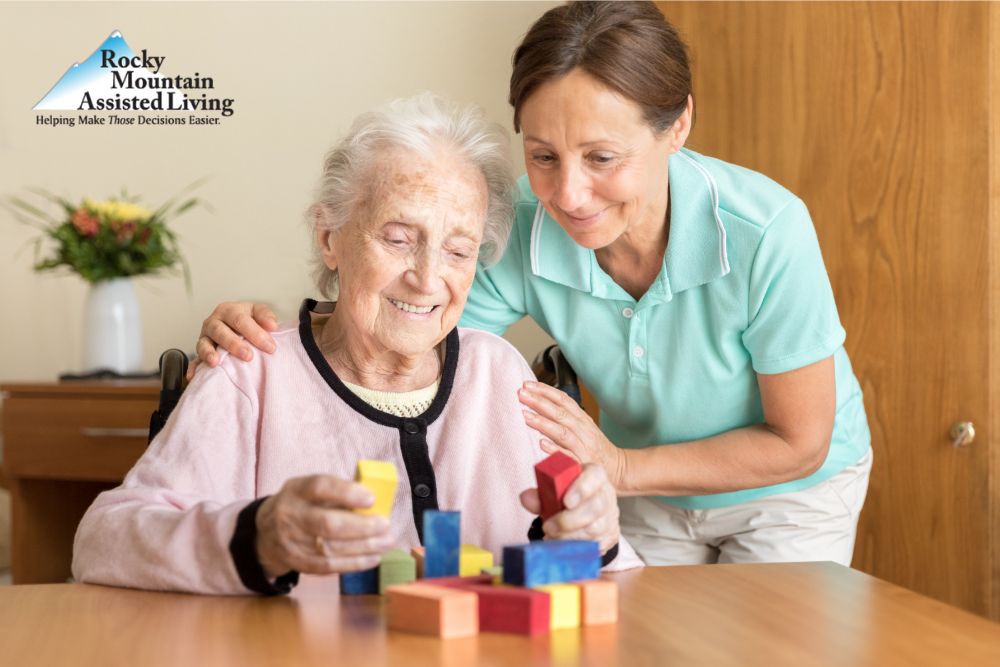Whether they live at home or they are in a memory care facility, making sure your loved one with dementia receives the proper care they need is vital. Because dementia slowly impairs the brain and causes memory loss, there are a variety of important aspects that go into caring for someone who has been diagnosed with it. One crucial part of that care is ensuring that they stay busy throughout the day and keep their brain active.
Why Is It Important to Keep Dementia Patients Occupied?
Staying engaged and active after receiving a dementia diagnosis is critical. Whether a person has recently been diagnosed or is nearing the end of their illness, staying active can provide a number of advantages.
Keeps the Brain Active
Because dementia gradually affects cognitive function, regularly staying busy with different activities can help to keep a patient’s mind active and slow the decline of their condition. Daily activities can not only help a patient stay independent as long as possible, but they also help them continue to maintain social, physical, mental, and motor skills.
Fights Anxiety and Depression
Dementia can be a confusing, isolating condition for anyone going through it. By staying occupied throughout the day, dementia patients can keep their minds busy and help them not wander. People with dementia often demonstrate a lot of body anxiety, such as fidgeting. Regular activities that keep them engaged and using their hands and minds can also help to battle any anxiety that they might be feeling.
Creates a Routine
It has been discovered that people with dementia perform better when they follow a routine. This helps to lessen any confusion while also providing some stability in their lives. Finding activities that you do on certain days or at certain times can help to create structure while also helping individuals remember things to the best of their ability.
Helps Them Feel Involved
Just because an individual with dementia is forgetful or slowly losing certain functions, it does not mean that they do not want to be involved with the things they used to love and enjoy. Because dementia can be isolating, keeping up with daily activities and staying busy can also help individuals feel more involved in their own lives. Without something to occupy them, people with dementia can feel intense anger, agitation, anxiety, and confusion.
Ideas for Keeping Dementia Patients Busy
There are a multitude of different activities that you can do with your loved one who has dementia.
Games
Games are an excellent way to keep busy and sharpen mental skills. From board games to brain games like puzzles or crosswords, there is a wide range of interesting games to choose from. Certain games, like bingo, can also be played in group settings and can encourage social interaction and fun between patients.
Arts and Crafts
Making crafts or different pieces of art is another great way to keep the mind engaged throughout the day. Art such as painting, drawing, and coloring has been found to be an amazing method to help individuals calm down, relieve anxiety, and practice mindfulness. Crafts like knitting or crocheting are also fun activities that encourage the use of physical, mental, and creative skills. Collages can be a great activity to promote creativity as well. They can even include old photos the patients are familiar with.
Physical Activity / Going Outside
The amount of physical activity a patient can do will be largely dependent on what stage their condition is at. Regardless, physical activity is still a great way to help your loved one with dementia stay as healthy as possible. Whether you go for a short walk or just sit on a bench, moving just a little and going outside is something that is important for anyone’s health. Yoga, meditation, stretching, and other slower forms of physical and mental activity are also recommended for those with dementia.
FAQs
Q: What are the early symptoms of dementia?
A: While each case is different, early signs of dementia can include:
- Increased forgetfulness
- Memory loss
- Rash mood changes
- Inability to concentrate
A person in the early stages of dementia can still take care of themselves with assistance. However, once the condition worsens, it may be time to consider moving to a memory care facility.
Q: What do dementia patients like to watch?
A: Every patient may have different tastes, but it has been known that TV shows and movies that help an individual reminisce are always good to put on. This could include TV shows or movies from their childhood. Otherwise, interesting shows that are easy to follow and do not deal with too much intensity are a good option.
Q: What are some coping strategies for dementia?
A: Dementia is an incredibly difficult condition to deal with, which is why having coping mechanisms is so important. Staying engaged in activities they love, staying active, going outside, finding new hobbies, and practicing mindfulness are all great ways to cope. Playing games and working on arts and crafts can also help to keep the mind engaged.
Q: When does a dementia patient need memory care?
A: While your loved one can stay relatively independent in the early stages of their condition, once dementia reaches the mid- to late-stages, it can become unsafe for an individual to be on their own. Increased forgetfulness, wandering, memory loss, failure to take care of oneself or their home, and aggressive behavior may all be signs it is time for memory care.
Rocky Mountain Assisted Living: Memory Care in Comfort and Safety
At Rocky Mountain Assisted Living, we understand just how complex it can be to care for someone struggling with dementia. That is why we are dedicated to providing the care that dementia patients need as their condition progresses. Our memory care services were created specifically to increase the comfort of our patients and help them continue to live an enjoyable life. To learn more about what we may be able to do for you or your loved one at Rocky Mountain Assisted Living, contact us today for more information.


